Photos: Valeria Rodriguez // @plaguepop
Darkwave duo Twin Tribes has become, in just a few years, one of the most respected and successful bands in the scene. With three albums in their career, they have played some of the most important festivals in the world and recorded a dark disco classic with “Fantasmas”. Now they return to Europe on a tour that we already know is going to end up with many soldouts. They will make us dance in the Batcave of the Belgian W-Fest, where they will perform next August 25th.
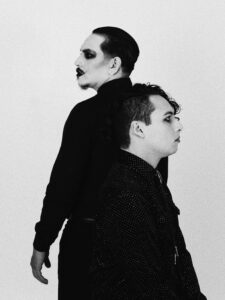 —The two of you played together in an indie band. Although there is not much indie sound in your music, is there anything good or bad that you learned during those days?
—The two of you played together in an indie band. Although there is not much indie sound in your music, is there anything good or bad that you learned during those days?
—Luis: Of course! I think we have learned a little from every project we have been a part of. All of those experiences shaped us to be the musicians that we are now.
—During those days, you Luis, got into Darkwave. The first time you were listening to dark music was in a club in Mexico when you were quite young, right? But it was during 2015/16 that darkwave caught your attention. What did you find interesting in this style and what were the first artists that you started to like?
—Luis: Yes, my first encounter with Darkwave was in a goth bar in my hometown in Matamoros, Mexico. This is where I heard The Cure, Depeche Mode, Billy Idol and other New Wave/Darkwave artists for the first time. Even though I loved it, I was very young, and my music journey would take me through several other genres until around 2015 when I revisited this genre with a whole new set of ears. This time I got more intrigued from a musician’s perspective which led me to seek more new music, at least new to me. Here is where I really dove into the genre and fell in love with several albums that would inspire Twin Tribes. Seventeen Seconds by The Cure, With Sympathy by Ministry along with Johnny Marr’s guitar tone and style influenced me deeply. Another thing that really inspired me was the simplicity and minimalism in the production aspect that led me to try to write Darkwave demos for the very first time.
—The band aesthetic and imagery are linked to occultism and you, Luis have confessed to being interested in all this. How much of this comes from your Mexican inheritance?
—Luis: There is a lot of occultism in Mexican culture. For me, I was first exposed to this by reading my uncle’s occult glossary that was hidden from the other books. Reading about the occult at an early age seemed like it was from another world, and it still does seem that way to me.
—Being Spanish I have to ask you about your influences from the rock en español scene. Being from Texas, I guess the influence from Latin America was bigger than the Spanish one. One of the bands that you have named that I did not know was Size, with a quite original sound that I found really interesting. What did you like about them? How do you think that they have influenced you?
—Luis: Rock en español is one of my biggest influences. The Latin American bands were huge in our area. However, I do know certain Spanish acts that were huge in Mexico like Héroes del Silencio, La Unión, Hombres G and Alaska y Dinarama. Size is one of Mexico’s first Darkwave bands. What I liked about them was their use of synthesisers and dancey vibe.
—Do you know Décima Víctima, Alphaville (the Spanish one, not the composers of Forever Young) or Parálisis Permamente? They were some of the first dark bands in Spain, maybe you will like them.
—Luis: I am familiar with Décima Víctima and Parálisis Peramanente. They are amazing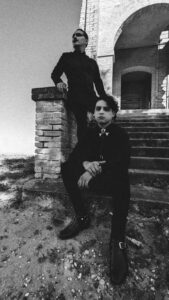 bands that people all over the world that like the genre recognize. I had never heard Alphaville before, but I liked what I heard so far. It reminds me a little of The Jesus and Mary Chain.
bands that people all over the world that like the genre recognize. I had never heard Alphaville before, but I liked what I heard so far. It reminds me a little of The Jesus and Mary Chain.
—How was the composing and recording of the first demo, Shadows? What was the biggest challenge that you have faced when doing the demo?
—Luis: It was an amazing experience. Once Joel and I got together, the composing part took a few months, but we were writing song after song. The recording was a process that took us around three months. We recorded only on Saturdays because we had regular jobs during the week. The biggest challenge was to create the gated reverb snare which is a huge staple in the genre. We recorded everything straight to tape using analog equipment.
—Your first album was first released by Spanish label Dead Wax. Were you surprised that the first label that was interested in you was from Spain, a place quite far from Texas? I am a big fan of the label and know Nico personally, what do you think of this first professional edition of your first material?
—Luis: Yes, I was shocked to hear from them. I never imagined getting noticed by a country that has contributed so much to the culture of rock music and is home to many of my influences. It was a pleasure to work with Nico and David for our first release. We are fans of everything that the label is currently doing. We never thought the album would gain so much recognition and that specifically the Dead Wax Records release would turn out to be such a rare and sought out vinyl.
—Being quite young, (you have said that you are babies from the 80s but honestly you look younger) what do you find interesting in that decade?
—Luis: So many things. 80’s cartoons, commercials, TV Shows, movies, music, aesthetic. Maybe because these things remind us of home or growing up.
—Speaking about the eighties, your first album made references to movies like The Dark Crystal and The Hunger. In recent years, movies like Super 8 and Attack the Block and especially series such as Stranger Things or Cobra Kai pay tribute to that decade. Do you think that we are becoming a nostalgic society? And how do you think that a young generation relates to a time that they did not live?
—Luis: We’ve seen this pattern in the past. I think we are a nostalgic society. When the 80’s kids grew up, they created a cultural comeback as a way to reminisce. Whether you lived during that time or not, there is still a certain longing we can all relate to. For the younger generation I think it’s the lack of interaction currently that draws their attention to a time where kids rode bicycles, played board games and interacted with each other.
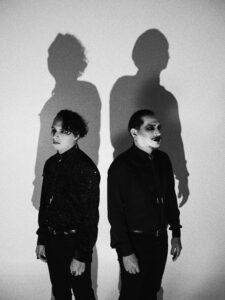 —You have used analogue equipment to record your first two albums, and you said that it gave the band some personality. But now in your last album you have recorded it with digital gear. What are the advantages for you of working with each of these ways?
—You have used analogue equipment to record your first two albums, and you said that it gave the band some personality. But now in your last album you have recorded it with digital gear. What are the advantages for you of working with each of these ways?
—Luis: Yes, we recorded Shadows and Ceremony straight to tape, the way artists would record in the 80’s. It was such a fun experience and a pleasure to work with Allen Michael who helped us produce the album. For Pendulum we decided to take a different approach and work with producer Charlie Vela. We recorded it digitally and used a mix of digital and analog synthesisers. I think both ways of recording have their unique and special touch. The advantage is that working digitally we are able to finish everything faster.
—Ceremony was, according to you, a collection of stories of love and loss. Was there any special event that influenced the album?
—Luis: Not just one but a collection of events that Joel and I were going through at the time is what influenced the album.
—How did you get the idea of the chorus in Spanish in “Fantasmas”? Did it help you get a better connection with the Spanish audience? I guess that in a way it resumes what the feeling of living in a border town is.
—Luis: I love the idea of switching between English and Spanish during a song. I first heard it in the Mexican Alternative band, Zoe and fell in love with it. I felt very identified, especially living in a border town where everyone switches from English to Spanish, back and forth. I think that the chorus in Spanish helped us connect with the Spanish speaking audience.
—During the pandemic, you released Altars, a collection of remixes of your songs with bands like Ash Code, Creux Lies and She Past Away. How did you get the idea of releasing this album and how did you select the artists to participate?
—Luis: During the pandemic many artists started remixing other artists songs to create content since shows were not possible. We received several requests to remix our songs and the first one was from Skeleton Hands. A little later came Matte Blvck and then Cult of Alia. After these three remixes were finished, Joel and I were shocked and excited about how good the remixes were and then we got the idea of creating a remix album with friends and artists we admire. That’s really when we started reaching out to the other artists and they all picked the songs they wanted to remix and then it all came together.
—As you have said, Pendulum explores duality, correspondence, and polarity. What inspired you to have this concept for the album?
—Luis: At the time I was reading the Kybalian and found the teachings fascinating. This is where we got the idea of the name of the album as well as the concept. The line that gave us the inspiration was “Everything flows, out and in; everything has its tides; all things rise and fall; the pendulum-swing manifests in everything; the measure of the swing to the right is the measure of the swing to the left; rhythm compensates.”
—Pendulum, is also more electronic. What made you move in this direction? The fear of repeating yourself?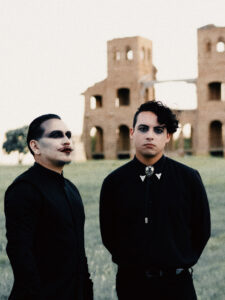
—Luis: Not exactly fear of repeating ourselves but musicians growing and seeking exploration. Getting new equipment and trying new sounds are all part of growing as a musician.
—And in Pendulum we finally have a song completely in Spanish where we can clearly see the influence of the rock en español movement. Do you think that this is a direction that you will follow in the future? I mean more songs in Spanish or with this kind of influence.
—Luis: After “Fantasmas” was released, we immediately decided we should release a full song in Spanish, and we had the chance to do that in Pendulum. “Sangre de Oro” was the first of hopefully more songs in Spanish. It’s something important to us and our fans as well.
—You said that the first time that you came to play in Europe was not the best experience. What happened? The language barrier maybe?
—Luis: It wasn’t necessarily a bad experience either. It was just very difficult at times because of the language barrier and also having the insane task of surviving a month-long tour with only a crew of three is not easy. Also, we had just finished another month-long tour in the US with only a week to rest before the next one started. It was a combination of things but we’re confident that this time it will be better.
—The band has toured a lot, from the very beginning. I guess that one of the worst moments of your career was when you were robbed in New York, right? At least you recovered the money with the Go Fund Me campaign that you started. Can you please tell us more about this?
—Luis: Yeah, that was definitely one of those moments. It was our first fly-in show ever. We were a little inexperienced as to what was the best way to travel for our band. We were travelling with money we had raised from touring and merch sales and when our luggage came back from TSA our money was gone. We later found out we were robbed by TSA in Texas when they went through our luggage. This was a huge loss for us since it was money that was going to be used for recording. Luckily, we were able to raise the money we lost through Go Fund Me. All of the people who helped raise the money were given a special mention and thanks in the vinyl insert in our album Ceremony. It’s nice to know that people that care about the band helped out when we needed it most and at such an early stage of the band as well. Such a humbling experience.
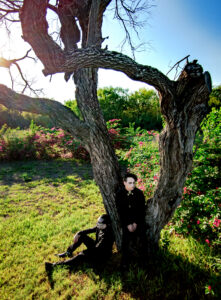 —I guess that it must be difficult to tour a lot and keep a normal life, especially now that you are starting to have a family (If I am not wrong one of you became a father some years ago) How do you think that touring has changed for you from the beginning to now?
—I guess that it must be difficult to tour a lot and keep a normal life, especially now that you are starting to have a family (If I am not wrong one of you became a father some years ago) How do you think that touring has changed for you from the beginning to now?
—Luis: Both of us are dads. I’m the newer dad, though. It’s a little difficult at times to tour and be a father but luckily, we have a great support system back home that allows us to be on the road with peace of mind. Also, we plan our year around dates we do not want to miss, and we try to keep a good balance of work and rest to be with our loved ones back home.
—Luis, you also said that you had a few problems with being a DACA recipient, and it was difficult for you to leave the country at the beginning of the band’s career. I’ve been reading about this Deferred Action for Childhood Arrivals and how the status of this law has been changed when democrats were ruling. I guess it must be quite difficult to live when you don’t know what the next administration is going to do. What are your thoughts about this?
—Luis: Yes, because of this reason we had to cancel what was going to be our second European tour. Being undocumented made it very difficult for the band to travel and having to live with the feeling of uncertainty isn’t nice either. It wasn’t until I was able to get a special permit called Advance Parole, which is for very specific reasons. I was able to get a special permit to go abroad for work purposes and that is how the first European tour happened. After I was granted this permit, it has been easier for the band to travel abroad and I’m very thankful for that.
—I guess that the song “Exilio” is in a way related to this. You, Luis said in an interview that you were undocumented for a few years. How do you think that living in such a situation has marked you as a person? I mean it must be weird to feel a citizen of the USA and at the same time be undocumented.
—Luis: Yes, the song “Exilio” talks about my feelings of uncertainty and being helpless. But always with an illusion and a spark of hope. This situation taught me that when it’s about your life, you have to be proactive and have to have determination to reach your goal. It’s so weird to me that at one point in my life I couldn’t leave Brownsville and now I get to travel the world and see so many beautiful countries.
—Joel, are you still running the record shop called Beso De Muerte? How is it going? Do you make the selection? Beso De Muerte has also released some records (yours, and artists like Luz Futuro, Ill Humans or Child of Night). Anything planned for the future?
—Joel: Yes, still running the record shop. With all the time I’ve taken to focus on the band, it’s been a little tough to continue to uphold the shop. I would release music for bands on physical formats, but stopped doing it because I felt the bands needed and deserved more of a push to help get their new music out to more people. That being said, recently I’ve had a little more help with the day-to-day band goings on, so I’ve been able to once again listen to new music. Yes, everything in my shop for the most part is hand selected. There are a few that may have dropped my way in collaboration with other record labels, but for the most part, the selection is mine. Yes, something is in the works!
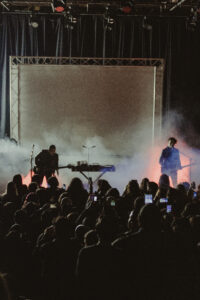 —In an interview you have said that you wanted to collaborate with Spanish project Luz Futuro (he did a remix for the Altars album). The first album was released by Beso de Muerte. What do you find interesting in the music of Daniel Benavides?
—In an interview you have said that you wanted to collaborate with Spanish project Luz Futuro (he did a remix for the Altars album). The first album was released by Beso de Muerte. What do you find interesting in the music of Daniel Benavides?
—Joel: Music is a feeling. When I first heard Luz Futuro, I can’t quite remember how, it may have been in passing through the Instagram algorithm some years ago, but I was instantly enamoured. While I don’t remember how I first listened, I do remember the song. It was “Sueños”. Love at first listen. From then on, I knew I had to help in any way I could to help get Daniel’s music out there. Luz Futuro was the first album I released through Beso De Muerte on cassette. A truly special moment for me, and one that inadvertently would lead us down the road of self-releasing our own music through our own means years later.
—And another band that you, Joel, have spoken about is Choir Boy. I guess that they are not that popular in Spain, although I quite like them. What do you find special in this band from Utah?
Joel: The voice. The composition of the songs. While I can’t quite put my finger on it, there’s some sort of nostalgia there that connects with me. I’m of the school of thought that while there are so many good songs out there, having a good album from beginning to end is increasingly rare. To my ears, Choir Boy has created two gems back-to-back with Passive with Desire and Gathering Swans. Both albums bring back memories of the times we were playing them constantly while out on the road.
—Although in Europe we have big festivals such as Treffen we were quite surprised with the incredible lineup of Cruel World. How was it playing there? I guess you met a lot of your idols.
—Luis: It was the biggest festival for us. It felt so surreal to be in a trailer next to Gang of Four, Gary Numan, and Molchat Doma just to name a few. Unfortunately, being so shy doesn’t help, so I only screamed internally.
—Joel: Yes, unfortunately, we weren’t able to meet our idols, but we certainly had a chance to admire and listen to them among the thousands in attendance. One of those unforgettable moments that exist in a dream I don’t want to wake up from.
—What can we expect of your concert at W-Fest?
—Luis: It’ll be our first show of tour so it will be extra special. Excited to be there with an amazing lineup!
—Joel: Our return to Europe. We are coming back stronger and with a fire in our hearts to give the best shows possible. I can’t wait.



